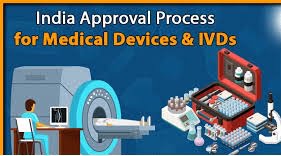The DCGI underscores the necessity of performing sample tests to verify that medical devices and in-vitro diagnostics (IVDs) comply with established standards.
DCGI medical devices and in-vitro diagnostics (IVDs)
DCGI medical devices and in-vitro diagnostics (IVDs) Dr. Rajeev Singh Raghuvanshi, the Drugs Controller General of India (DCGI), has stressed the importance of ensuring that medical devices and in-vitro diagnostics (IVD) sold in the country meet the quality and performance standards set by the Bureau of Indian Standards (BIS).
In a circular directed at stakeholders, including testing laboratories and manufacturing associations in the medical device sector, the DCGI outlined the necessity for adherence to these standards.
“…it must be ensured that the samples of medical devices comply with BIS standards for quality and performance, and that testing is conducted according to these requirements,” stated the regulator.
He further clarified, “If no BIS standard is available, only then may other standards mentioned in Rule 7 of the Medical Devices Rules (MDR) be applied.”
To ensure the quality, safety, and efficacy of medical devices and IVDs, the Union Ministry of Health and Family Welfare has authorized the registration of laboratories to test and evaluate these products on behalf of manufacturers, as outlined in Chapter X of the MDR, 2017. This move aims to enhance the testing infrastructure within the country.
Following the implementation of the MDR, 2017, which took effect on January 1, 2018, the Drug Rules, 1945, no longer apply to medical devices and IVDs.
As per Rule 7 of the MDR, medical devices must adhere to the standards established by the BIS under Section 3 of the Bureau of Indian Standards Act, 1985, or as notified by the Ministry of Health and Family Welfare from time to time.
A second sub-rule specifies that if there is no established standard for any medical devices under sub-rule (1) pertaining to BIS standards, those devices must adhere to standards set by the International Organisation for Standardisation (ISO) or the International ElectroTechnical Commission (IEC), or any other recognized pharmacopoeial standards.
If the standards are not specified in these two sub-rules, the device must comply with the validated standards set by the manufacturer.
The drug regulator has noted that even when BIS standards are available for certain medical devices, testing is not being conducted according to these standards.
It is important to mention that the central drug regulator has repeatedly urged private medical device testing facilities to register themselves as Medical Devices Testing Laboratories (MDTL) on behalf of manufacturers. This effort aims to strengthen the MDTL network to meet the increasing demand for quality testing.
The Central Drugs Standard Control Organisation (CDSCO) oversees the quality, safety, and performance of medical devices under the Medical Device Rules, 2017. Following the enforcement of two notifications on February 11, 2020, all medical devices are now regulated under the Drugs and Cosmetics Act, 1940, and the Medical Device Rules, 2017.
As the scope of medical devices expands, there’s a growing need for additional testing facilities to ensure timely evaluation of these products. The regulatory body has been actively working to establish infrastructure for testing both domestically manufactured and imported medical devices, aiming to prevent delays in bringing them to market.


Presently, specific private testing laboratories are registered under the Medical Device Rules (MDR) of 2017 to conduct examinations on certain medical devices within the country on behalf of manufacturers.
To bolster the private testing capacity for medical devices nationwide, the Central Drugs Standard Control Organization (CDSCO) is in the process of identifying existing private labs equipped to conduct various tests required for medical devices, such as physical, chemical, microbiological, mechanical, and electrical evaluations. The Drug Controller General of India (DCGI) has issued requests for labs to come forward and apply for registration under MDR 2017 to perform these tests on behalf of manufacturers.
As of September 2023, CDSCO has approved a total of 39 laboratories across India to carry out tests or evaluations of medical devices on behalf of manufacturers, as per applications submitted under Form MD-40 of MDR 2017. This includes nine laboratories approved in 2023, including those of the public sector undertaking HLL Lifecare Ltd and the Atal Incubation Centre (AIC), Medivalley at Andhra Pradesh MedTech Zone (AMTZ).
Additionally, in December 2022, DCGI called upon laboratories with adequate quality accreditation and testing capacity for medical devices to submit applications, further strengthening the network of Medical Device Testing Laboratories (MDTLs) in the country.
Until 2017, the medical device sector in India largely operated without comprehensive regulation. However, with the introduction of the Medical Device Rules in 2017 by the Ministry of Health and Family Welfare (MoHFW), a phased regulatory framework was established to oversee the quality, safety, and efficacy of medical devices under the Drugs and Cosmetics Act of 1940. The government subsequently classified devices into four classes and implemented a licensing regime in phases, aiming to encompass all devices by 2023.

